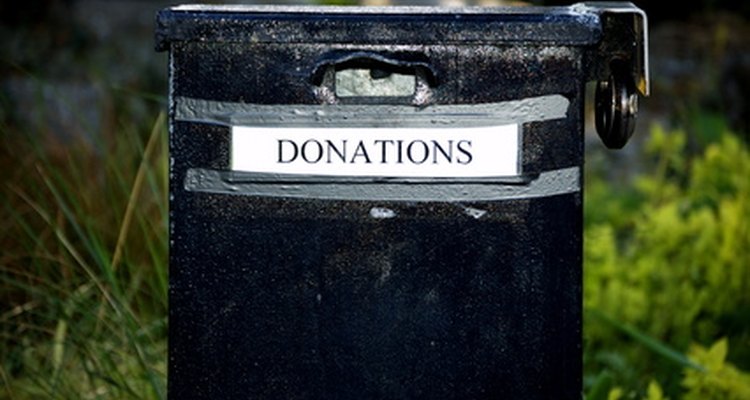
When you find out someone you know has cancer, you might feel helpless. You can't make the person better, but you can help out in other ways, including financially. Even if the patient has good health insurance, there's likely money going toward medical bills, travel expenses and medication. Add in the missed wages from time off work, and the financial toll can be high. Planning a benefit for the cancer patient helps ease that burden.
Create a Committee
A fundraiser is only as effective as the planning committee. Lots of people want to help, but you need a small, powerful group to handle planning. Bring in other volunteers to help with other aspects of the benefit. Form the committee as early as possible to give the members the time necessary to plan a successful event.
Choose people who know how to get things done. Look for people with attention to detail and the ability to follow through. Someone who already has experience planning a benefit can be very helpful in deciding what works well. It's also a good idea to have people with connections to find sponsors, get discounts on services and spread the word.
Decide on the Event
The activity you do depends largely on the person you're raising money to help. If you're raising money for a child with cancer, choose an activity the child likes or something that is child-friendly like a dance-a-thon or carnival. For adults, choose something that matches their interests. For a gardener, you might sell floral arrangements. If the patient loves bowling, arrange a bowling challenge. Other factors include your available resources and the amount of time you have to plan the event. Complex activities with lots of elements require more lead time.
Consider the following fundraiser ideas:
- Meal
- Walk or run
- Dance-a-thon
- Concert
- Group workout
- Selling handmade items
- Garage sale
- Silent auction
- Car wash
- Bingo night
- Gala
- Trivia night
- Vendor fair
- Carnival
Consider the Financial Aspects
You're trying to raise money for your friend, but benefits also cost money to host. Consider both sides of the financial aspect. You can save money on the venue by hosting it at a church or at someone's home. You may be able to get a discount on a venue rental if you hold the event at an off time and let the owner know it's a fundraiser.
Other common expenses include:
- Food
- Fees for servers if needed
- Table and chair rentals
- Tent rentals for outdoor events
- Decorations
- Entertainment
- Door prizes for things like raffles
- Advertising costs
- Security
The other expenses depend largely on what type of event you host. If you host a bingo night, you need the bingo cards, bingo balls and a PA system. If you're having a carnival, you need booths, games, tickets and prizes.
Consider how you'll make money as part of the fundraiser. You can charge admission or sell tickets for the event. Another option is to ask for donations. If you're selling something, you make money from those sales.
You can also add on extra optional ways to bring in money. Some examples include:
- Valet parking
- VIP tickets with special seating or other perks
- Coat check
- Ad sales
- Silent auction as part of a larger event
- Professional photos
- T-shirts, bracelets or other items
- Babysitting
Handling the Money
Handling the money properly helps you avoid any legal issues. Set up a separate bank account to hold the funds you raise. Put one person in charge of managing the account. Work with the bank to make sure the beneficiary is able to access the funds. You may need to provide that person's social security number, for example. If you're raising money for a child with cancer, you will likely need to designate a parent or guardian as the beneficiary.
Donations to a benefit for an individual are generally considered personal gifts. That means they aren't tax deductible for the donors. The recipient generally does not have to pay income tax since the money is considered a gift, but there may be exceptions. For example, if you use a bank account that earns interest, the interest earned may be taxable. The specifics can vary by state on the state income taxes. Check with a CPA or attorney before holding the fundraiser to clarify the tax and legal implications.
Planning the Details
With your event chosen and the financials under control, it's time to plan the details. Pin down the date, time and location of the event first. Choose your vendors for everything you plan to hire out. Reserve the venues and vendors early.
Create a schedule of events, and detail everything you plan to have at the event. If you're having a spaghetti supper, you might also have live music, a silent auction and games for kids. Be very specific with everything you plan to have. It can be helpful to assign a point person for each part of the benefit.
Once you break down the details, pull in the other volunteers. Create individual jobs, so you can assign tasks to those volunteers. This also helps to ensure everything gets done as needed. Create a timeline for all of the tasks that need to be done before the event to ensure you stay on track.
Spread the Word
Another important aspect of the planning process is letting everyone know about the event. The committees and volunteers are a good starting point to spreading the word. If you're partnering with a church or other organization, ask it to help share the event. Printing flyers is an effective way to let people know about the event. Advertising in local publications is another option. Ask the publisher if it can offer free or low-cost advertising.
Take advantage of technology by using social media to promote the benefit. Create a Facebook page to share details, and ask people to share the page. Create hashtags for Twitter and Instagram, so you can get people talking.
Related Articles

How to Plan a Poker Run

How to Plan a Donation Drive for a ...

How to Organize a Motorcycle Rally

Ideas on How to Organize a Fun Day for ...

How to Have a Fundraiser for an Ill ...

How to Organize a Charity Sports Event

How to Organize a Hot Dog Eating Contest

How to Organize a Church Bazaar

How to Start a Booster Club With Parents

How to Organize Community Events to ...

How to Organize a Rave

Competition Theme Ideas

How to Form a Pub Crawl to Raise Money

Humanitarian Project Ideas

How to Organize a Barbecue Contest

Tips for Catering a Wedding Reception ...

How to Form an Event-Planning Committee

Fundraising Ideas for Martial Arts

How to Organize a Wedding Fair

List of Community Service Project ...
References
Resources
Tips
- Contact people who have hosted successful fundraisers in your specific community for tips and advice.
- A 50-50 raffle is a good way to raise extra money during the benefit. People purchase raffle tickets and the winner of the raffle gets 50 percent of the proceeds.
- Check your state laws to ensure you do not need to fill out any tax forms before collecting donations.
Writer Bio
Shelley Frost writes professionally on a full-time basis, specializing in lifestyle, family, parenting and relationship topics. She holds an education degree and has extensive experience working with kids and parents.
Photo Credits
Donations image by Rebs O from Fotolia.com